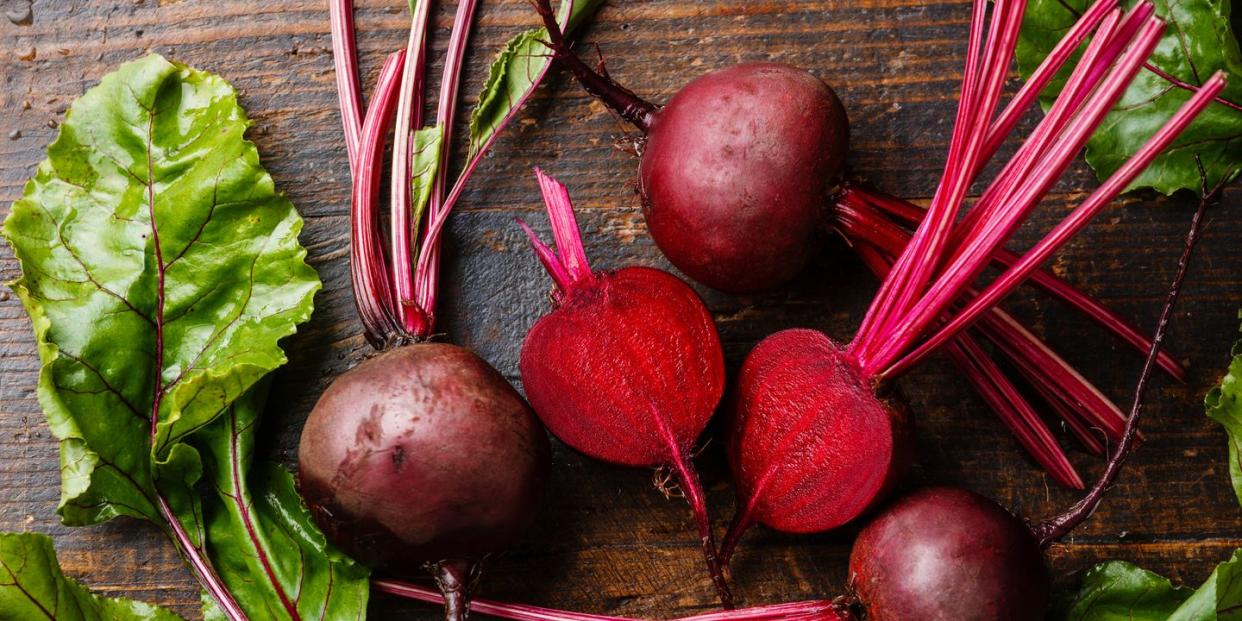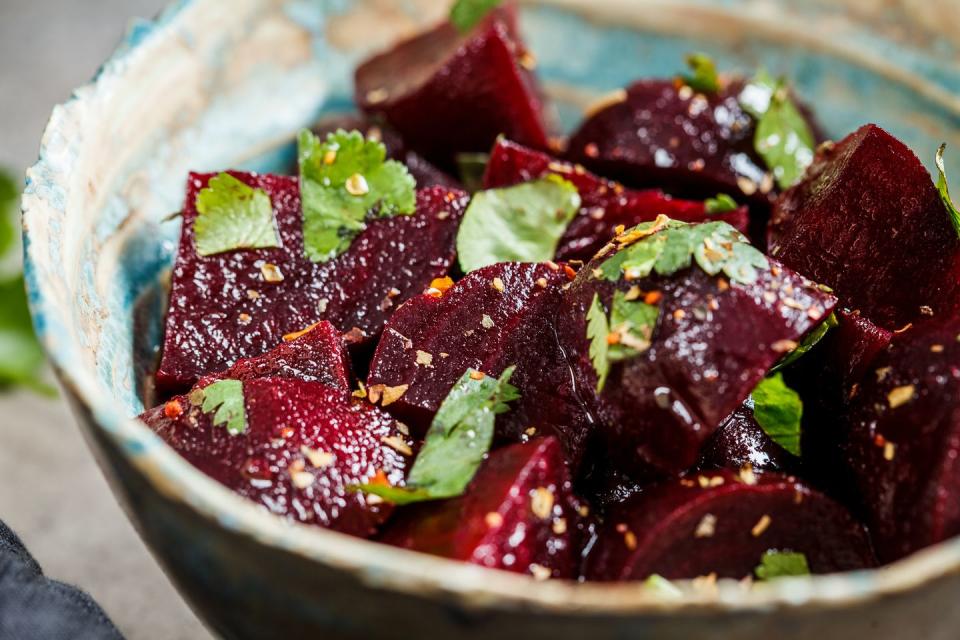Adding More Beets to Your Diet Could Do Wonders for Your Skin

Beetroot, the official name of the good-for-you beet vegetable, is a low-calorie food that can help your heart, GI system and more, according to the Mayo Clinic. To say that beets are rich in health benefits is an understatement. "Beetroot is packed with several essential nutrients such as iron, potassium and vitamin C and is also a great source of dietary fiber," says Grace Pascale, registered dietitian nutritionist & founder of Grace Pascale Nutrition.
Here, we answer your top questions about beets, including the nutritional facts and health benefits surrounding this vegetable.
Types of beetroot:
Red: These taste delicious roasted, and are great in soups like a traditional borscht.
Golden: This is a variety that adds a nice mellow flavor to soups too, and are great in a veggie stir-fry.
Chioggia: These are striped inside, like a peppermint swirl. Very tasty raw or cooked as a side dish.
Baby beets: Serve them raw with their leaves and a light dressing, and you have an amazing appetizer before dinner!
Beetroot nutrition facts:
One cup of beets has the following nutrition profile:
Calories: 58
Total Fat: 0.2g
Sodium: 106mg
Total Carbohydrate: 13g
Dietary Fiber: 3.8g
Sugar: 9.2g
Protein: 2.2g
Calcium: 21.76mg
Iron: 1.09mg
Potassium: 442mg
Is beetroot high in carbs?
At 13g per serving, beets are considered to be on the higher side of the carb scale. If you’re trying to keep your carbs low, you may want to consume them in moderation.
What about fiber in beets?
Beets are a super source of fiber. According to Cleveland Clinic, fiber can help control your blood sugar, plus keep your cholesterol in check and help you avoid constipation.

What are some key vitamins and minerals in beets?
Betanin: Cleveland Clinic data states that this natural plant pigment is rich in antioxidants, which protect your cells from heart disease and cancer. Betanin also is anti-inflammatory; it fights the inflammation related to Type 2 diabetes, high blood pressure, heart disease, asthma and obesity.
Folate, potassium, magnesium, and vitamin C: Beets are an excellent way to get all of these! Here’s why this is important: Folate is an essential nutrient that’s key for basic cell function. Potassium helps the body maintain normal fluid levels. Magnesium is critical for bone and heart health, and vitamin C also protects your heart as well as your eyes and immune system.
What are other beetroot health benefits?
Beets contain high levels of nitrates. According to data from Harvard Medical School, nitrates are converted by your digestive system into the compound nitric oxide. In turn, nitric oxide acts as a relaxant for your blood vessels, widening them so your blood pressure goes down naturally. Additional research found that the dietary nitrate in beets may cut the overstimulation of the sympathetic nervous system, which can happen if you have heart disease. It's possible that beetroot juice could actually become a cardiovascular treatment in the future.
A new study has shown that the nitrates in beetroot could reduce the chance of developing early-stage age-related macular degeneration, a leading cause of blindness — 100 to 142 mgs of vegetable nitrates each day was found to be related to a 35% lower risk of developing the disease.
A recent study from the University of Exeter found that an ingredient in beetroot juice promotes a specific mix of oral bacteria that can boost the health of blood vessels, plus potentially increase brain function.
What are the benefits of beetroot for your skin?
That plentiful amount of vitamin C in beetroot means that the veggie is great for healthy skin; vitamin C may even be able to stop and/or treat UV damage. So eating your beets could indeed help your skin look better.
What are the benefits of beetroot for weight loss?
"The fiber in beets aids in weight management by nourishing the gut microbiome, a key factor in determining the body's set point weight range—as well as contributing to fullness and satisfaction,” explains Pascale.
Editor's Note: Weight loss, health and body image are complex subjects — before deciding to go on a diet, we invite you gain a broader perspective by reading our exploration into the hazards of diet culture.
What are the possible side effects of beetroot?
If you love beets, you may wonder whether it’s okay to eat them every day. People who have kidney stones should eat them only in moderation, says Cleveland Clinic data, since they contain oxalates, which can contribute to developing these stones. And if you’re trying to follow a low-FODMAP way of eating, understand that beets are high in natural sugars called oligos. Consider eating half the amount you normally would—for instance, have two beet slices as opposed to four.
The bottom line on beetroot:
Along with all the health benefits, there’s the yum factor as well ‑ and the fact that beets are a super-versatile vegetable. "Beets are delicious steamed and marinated, shredded atop salads or tacos, pickled as a condiment for sandwiches and buddha bowls, or even cooked into veggie burger patties with beans or legumes for a protein-packed meat alternative,” says Pascale.
You Might Also Like

